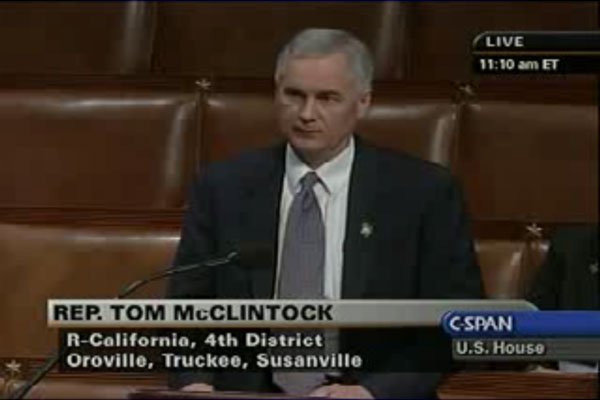Congressman Tom McClintock gave an outstanding speech in the well of the House of Representatives earlier this week. You can watch him deliver the remarks here, or you can read them below…
 M. Speaker:
M. Speaker:
The Laffer Curve is a simple but elegant method of demonstrating how increasing taxes reduces economic productivity until a point of equilibrium is reached when further tax hikes actually reduce revenue.
If the tax rate is zero, tax revenues are zero. But if the tax rate is 100 percent, tax revenues also reach zero, because there’s no point in working.
Thus, every increase in a tax rate produces a progressively smaller return of tax revenues as people adjust their behavior to reflect the reduced value of their work. When taxes exceed an economic tipping point, revenues begin to fall.
California vividly demonstrated this effect in 1991 when Gov. Pete Wilson imposed the biggest state tax increase in American history.
The $7 billion tax hike – a staggering combination of increases in sales, income and car taxes – broke the back of California’s economy.
While the rest of the nation’s economy expanded, California entered into a nose-dive, including the biggest plunge in retail sales in 30 years.
Those taxes brought in barely half of the new revenue predicted and then produced two consecutive years of billion-dollar-a-year declines in state revenues.
California is about to get another very expensive lesson in the Laffer curve, courtesy of a $13 billion tax increase that will sock an average family with more than $1,200 of new taxes.
We should watch California’s experience carefully in the days ahead, because it will be a harbinger of the impact we can expect under President Obama’s proposed tax increases.
Although California already has the highest sales tax in the nation, and it is about to rise by another 13 percent (or a penny per dollar).
Although California already has the highest income tax in the nation, it is about to have an additional quarter percent increase.
Although California’s sales tax is the second biggest generator of revenue for the state and automobile sales comprise a fifth of all sales taxes, the state has also doubled the car tax and is lobbying for new regulations that will increase the price of a new car by as much as $5,000.
Benjamin Franklin said that “Experience keeps a dear school, but fools will learn in no other.”
Appropriately, the California tax increases will take effect on April Fool’s Day, illustrating that some people won’t even learn from experience.
But perhaps there is hope. If California’s experience with the Wilson tax increases is any indication, the impact of the Scharzenegger tax hike is likely to be immediate and devastating.
Perhaps it may serve as an invaluable lesson for the Obama administration, which last week announced a whopping tax increase of $1.4 trillion over the next ten years – averaging about $1,800 per family per year.
I know, the President promises that these taxes will fall only on the very wealthy (individuals earning $125,000 and couples earning $250,000). But the fact is that 65 percent of these folks aren’t folks at all – they’re small businesses that are the very foundation of our economy, many of which are barely holding on as it is.
The other tax will directly hammer families with higher energy and consumer prices through a $656 billion carbon tax.
It’s not that another example should be necessary. Herbert Hoover’s response to the recession of 1929 was to increase the marginal tax rate from 25 percent to 65 percent and to burden international trade with steep tariffs.
Obama’s tax increase has yet to be enacted, and if passed this year it will not take effect until 2010. By then, California will have become a poster child for governments gone wild, a vivid warning of life on the downside of the Laffer Curve.
It’s a lesson that may yet save our nation from an economically devastating mistake.

